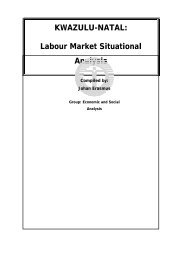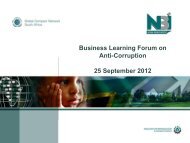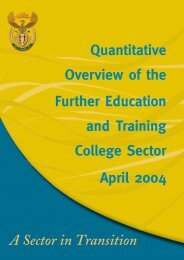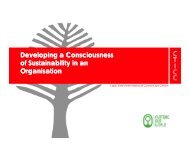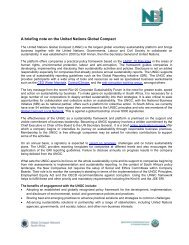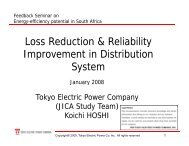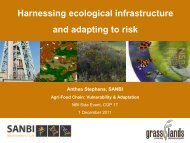<strong>Forest</strong> carbon and otherecosystem services briefing note4 of 5New Application HOMEWaste not, want not? The future of recycled fibre streamsThe waste management industry has received a major boost from the many measures aimed at increasing waste recoveryand recyclability and reducing waste to landfill. There has been significant deal activity in the waste management sector, withhandsome premiums often paid by companies seeking to enter into or grow in the sector. It has now been realised that wasteconstitutes a potentially valuable resource stream. The European paper industry, with around 50% of its fibre feedstocksourced from recovered paper, is fully aware of this. Bundled waste paper now makes long-distance journeys to countriesshort of quality waste, as with the case of China sourcing waste paper from the US and the UK.Recovered fibre must still be supplemented by sustainably harvested fresh fibre, as both are required to maintain a healthypaper fibre supply. Fresh fibre is always required in the fibre cycle, since not all paper can be recovered and wood fibres aredegraded through the recycling process. The availability of waste paper has led to the growth of urban paper mills that areclose to their feedstock, waste paper, and their customers. These mills face a number of challenges, including ensuringsufficient purity of their waste paper stream and disposing of the sludge left from de-inking and cleaning the waste fibres. Evenmore importantly, urban paper mills are harder hit by energy price increases, because producers are typically unable to benefitfrom the inherent energy in the wood fibre used by integrated mills.Producers of fresh (virgin) pulp are not the only ones who may face competition for their fibre. Many European paperproducers using recovered fibre have been concerned that they would face similar competition from energy producers forwaste paper, as the economics of renewable energy production could potentially favour incineration. Future deal activity maybe driven by waste collectors looking to use non-recyclable waste to produce highly efficient, low-cost power and heat toprovide a platform for energy intensive industrial processes such as pulp production and papermaking.As demand increases by environmentally conscious consumers for papers with a high recycled fibre content, produced in acarbon neutral process, both the economics and sustainability of a waste-based platform for energy and paper production maylook attractive.Page 58pwc
<strong>Forest</strong> carbon and otherecosystem services briefing note5 of 5New Application HOME‘Timber-plus’ investment strategiesInvesting in forestland based on the traditional return drivers of biological growth, timber values and sometimes land values hasbecome an attractive investment theme in its own right. However, as we look towards the future, the definition of commercialtimber values will continue to expand beyond traditional sawlog and/or pulplog values to include the potential value of the woodas energy.A further set of opportunities is starting to arise from the environmental services (or ‘ecosystem services’) provided by forests.As time passes, awareness is increasing of the valuable role of trees and forests in carbon sequestration and hence inmitigating some of the effects of global climate change. Most notably, the role of forests as a carbon sink could become asource of significant revenue – and ‘timber-plus’ investment strategies are receiving growing interest.The Kyoto Protocol explicitly named afforestation and reforestation as potential avenues for offsetting carbon dioxide emissionsand hence, in principle, projects could be generated under either Kyoto’s Clean Development Mechanism (CDM) or JointImplementation (JI) schemes. In practice and for various reasons, this has not happened. The world’s currently dominantcarbon trading system, the EU-Emissions Trading Scheme, does not include options for achieving emissions reduction units(ERUs) via forest activities. Further, the US does not yet have a mandatory emissions reduction or trading systems. For thesereasons, the voluntary markets present more opportunities for forestry carbon projects. According to the Greenhouse GasMarket Report 2007 from the International Emissions Trading Association (IETA), the market share of forest carbon projects intotal voluntary carbon projects was 36% in 2006 –there was a similar percentage in 2007. The Chicago Carbon Exchange(CCX) has emerged as the first voluntary, legally binding greenhouse gas reduction and trading system for emission sourcesand offset activity. The CCX does allow forest carbon sequestration, and some trades have occurred.In consequence of the Bali Action Plan in December 2007, recent attention has also turned to how REDD, a framework ofincentives to reduce deforestation and forest degradation, might work under any post-2012 climate treaty to succeed thecurrent Kyoto Protocol. There is a long way to go in terms of producing a framework, but the very fact that work is in progresshas begun to spawn specific project ideas for compensating forest communities for avoided carbon emissions, with projectsalready launched, for example, in Indonesia and Guyana.In short, in recent months, there has been a surge of activity in proposed forest carbon sequestration and trading and offsetschemes, either as activities separated from traditional timberland investment strategies (such as those based on avoideddeforestation in the tropical rainforest) or as an integral but incremental part of a traditional investment platform (for example,an afforestation scheme that generates a carbon credit revenue stream over the growth cycle, before the timber is harvestedon maturity and then regrows). Inevitably, there are many complexities with selecting, designing and executing specificschemes, but given a growing imperative to combat climate change and the important role that trees and forests could play,significant markets in forest carbon look likely to develop.<strong>Forest</strong> carbon and ecosystemservicesInvestors and lenders considering providing finance forforest carbon projects need to ensure that the projectsfocus on:• Long-term carbon storage and sequestration in bothforests and harvested wood products• Enabling sustainable development• Enhancing biodiversityMacro-level questions• Is a funding strategy in place and finance-raisingmoving?• Are markets, methodologies, and validatorunderstood?• Have buyer appetite and concerns been established?• Do developers and investors understand government/ cabinet sentiment?Micro-level questions• Is there on the ground understanding on current landoccupancy and stakeholders?• Are practical risks being monitored systematically?• Is a robust and reviewed model for carbonsequestration being used?• Have legal rights over land and carbon been clarified?Page 59pwc



